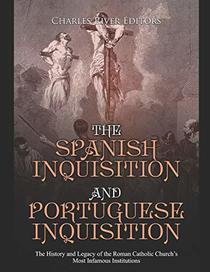The Inquisition started in France in the 12th-century to combat the Cathars and Waldensians, who were considered heretical by the Catholic Church. Cathars believed in two gods (deistic), one good and the other evil. Waldensians would be considered an early form of the Protestant Church; they believed in the priesthood of all members and that each congregation was independent (of the Pope).
In the early years, local clergy acted as judges. In the early questioning, most of the sentences resulted in penances. However, unrepentant heretics were turned over to the secular courts, and the punishment was a life sentence or execution. However, because each of these early judges could be too harsh or too lax, the Church decided to use members of the Dominican Order to hold the questioning (with questions formulated by the Pope). This change occurred in the 1250s.
As the Renaissance bloomed across Europe, the scope of Inquisitions grew in response to the Protestant Reformation. The Spanish and Portuguese Inquisitions focused on the forced conversion of Jewish and Muslim citizens in their countries. Incredibly, even after conversion to Catholicism, these same groups were suspected of not really converting and were still persecuted. The Inquisition policy was 'guilty until proven innocent.' Torture was used routinely against those accused of heresy as well as those who were 'witnesses.'
Spain and Portugal exported their Inquisitions to their burgeoning empires in Africa, Asia, and the Americas. The info shared on the Goa Inquisition (Portugal had a trading center in Goa, India), was grizzly. The Inquisition even affected the Indian natives (generally Hindu). In other words, the Portuguese dictated religion in the region where they traded (but did not own). The Portuguese investigated the religious traditions of the Hindi and forbade each of them specifically. The minutiae of the rules listed were astounding; they tried to obliterate Indian culture and religion (that was older than their own). Before it was all over, gifted writers and great minds were scrutinized and threatened.
In Spain, the Inquisition was established in 1478 by the Catholic monarch, King Ferdinand and Queen Isabella. The idea was to control Catholic orthodoxy in their kingdoms and to replace the papal Medieval Inquisition. When Joseph Napolean came to the throne, the Inquisition was stopped in 1808. Later, it was restored by Ferdinand VII in 1814, then suppressed in 1820. It was disbanded in July 1834.
In Portugal, Manuel II had asked for the institution of an Inquisition as part of his commitment to marry Maria of Aragon. However, it wasn't until after his death that the pope agreed to the plan. The Portuguese Inquisition was formally established in 1536 and ended in 1821.
Please note: Charles Rivers has a separate book about the Inquisition in the Americas.
In the early years, local clergy acted as judges. In the early questioning, most of the sentences resulted in penances. However, unrepentant heretics were turned over to the secular courts, and the punishment was a life sentence or execution. However, because each of these early judges could be too harsh or too lax, the Church decided to use members of the Dominican Order to hold the questioning (with questions formulated by the Pope). This change occurred in the 1250s.
As the Renaissance bloomed across Europe, the scope of Inquisitions grew in response to the Protestant Reformation. The Spanish and Portuguese Inquisitions focused on the forced conversion of Jewish and Muslim citizens in their countries. Incredibly, even after conversion to Catholicism, these same groups were suspected of not really converting and were still persecuted. The Inquisition policy was 'guilty until proven innocent.' Torture was used routinely against those accused of heresy as well as those who were 'witnesses.'
Spain and Portugal exported their Inquisitions to their burgeoning empires in Africa, Asia, and the Americas. The info shared on the Goa Inquisition (Portugal had a trading center in Goa, India), was grizzly. The Inquisition even affected the Indian natives (generally Hindu). In other words, the Portuguese dictated religion in the region where they traded (but did not own). The Portuguese investigated the religious traditions of the Hindi and forbade each of them specifically. The minutiae of the rules listed were astounding; they tried to obliterate Indian culture and religion (that was older than their own). Before it was all over, gifted writers and great minds were scrutinized and threatened.
In Spain, the Inquisition was established in 1478 by the Catholic monarch, King Ferdinand and Queen Isabella. The idea was to control Catholic orthodoxy in their kingdoms and to replace the papal Medieval Inquisition. When Joseph Napolean came to the throne, the Inquisition was stopped in 1808. Later, it was restored by Ferdinand VII in 1814, then suppressed in 1820. It was disbanded in July 1834.
In Portugal, Manuel II had asked for the institution of an Inquisition as part of his commitment to marry Maria of Aragon. However, it wasn't until after his death that the pope agreed to the plan. The Portuguese Inquisition was formally established in 1536 and ended in 1821.
Please note: Charles Rivers has a separate book about the Inquisition in the Americas.




